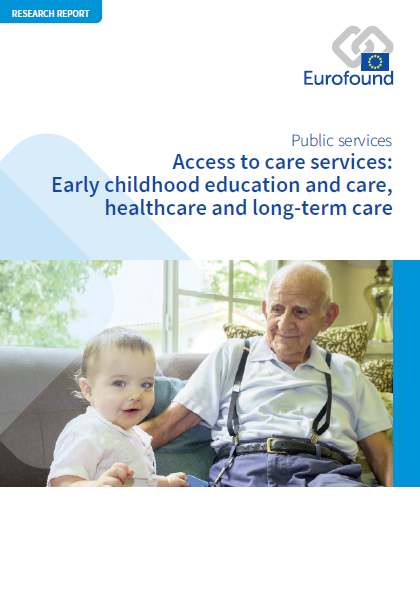
Pravica do dostopa do kakovostnih storitev varstva in oskrbe je poudarjena v evropskem stebru socialnih pravic. To poročilo je osredotočeno na tri vrste storitev varstva in oskrbe: predšolsko vzgojo in varstvo, zdravstveno varstvo in dolgotrajno oskrbo. Dokazano je bilo, da dostop do teh storitev prispeva k zmanjšanju neenakosti v celotni življenjski dobi posameznika in k zagotavljanju enakosti za ženske in invalide. V poročilu, ki temelji na prispevkih mreže dopisnikov Eurofounda in lastnih raziskav Eurofounda, je prikazan pregled stanja v različnih državah članicah EU, na Norveškem in v Združenem kraljestvu. Poleg tega so v njem opisane ovire za uporabo storitev varstva in oskrbe ter težave zaradi razlik pri dostopu med skupinami prebivalstva. Poročilo je posebej osredotočeno na tri področja, na katerih bi lahko izboljšali dostop do storitev: predšolsko vzgojo in varstvo za invalidne otroke in otroke s posebnimi potrebami, e-zdravstvo in nadomestno oskrbo.
Key findings
Težave, ne le nezadovoljene potrebe. Ljudje lahko sicer pridejo do oskrbe, ki jo potrebujejo, vendar se v vsaki fazi postopka spopadajo z mnogimi težavami.
Poglavitna ovira je cenovna nedostopnost, ki pa je ni mogoče odpraviti le z znižanjem stroškov varstva in oskrbe, če se hkrati ne upoštevajo širše potrebe gospodinjstev v zvezi z dohodki in odhodki.
Za učinkovito uveljavljanje pravice do dostopa je pomembno, da se osredotočimo na več razsežnosti v celotnem procesu, od opredelitve do zadovoljevanja potreb, tako da obravnavamo dejavnike na ravni gospodinjstev, organizacije in družbe.
Številni ljudje ne uporabljajo storitev predšolske vzgoje in varstva ali dolgotrajne oskrbe, ker to uredijo na neformalen način, vendar bi jim te storitve lahko koristile, če bi bile cenejše, bolje prilagojene ali bolj kakovostne.
Da bi dostop do zdravstvenega varstva postal odpornejši na gospodarske pretrese, bi moral biti manj odvisen od dohodka in zaposlitve.
Table 1: Number of respite care recipients, selected countries
Figure 1: ECEC, healthcare and long-term care in the European Pillar of Social Rights
Figure 2: General framework for access to care services
Figure 3: Main reasons for not using professional ECEC, EU27 and the UK, 2018 (%)
Figure 4: Main reasons for not meeting needs for formal ECEC services, EU27 and the UK, 2016 (%)
Figure 5: Level of difficulty in affording ECEC services by income group, EU27 and the UK, 2016 (%)
Figure 6: Proportion of people reporting unmet medical needs and main reason, EU27 and the UK, 2018 (%)
Figure 7: Main reason for unmet medical needs, EU27 and the UK, 2018 (%)
Figure 8: Financial barriers to accessing healthcare: ‘unmet needs’ versus ‘access difficulties’, EU27 and the UK, 2016 (%)
Figure 9a: Unmet needs due to any reason, by employment status, EU27 and the UK, 2010–2018 (%)
Figure 9b: Unmet needs due to affordability, by employment status, EU27 and the UK, 2010–2018 (%)
Figure 10: Proportion of people anticipating difficulties paying for particular types of healthcare, by income quartile and employment status, EU27 and the UK, 2016 (%)
Figure 11: Proportion of people with severe long-standing limitations due to health problems, by age group, EU27 and the UK, 2018 (%)
Figure 12: Use of formal long-term care in previous 12 months by respondent or someone close to them, country groupings, 2016 (%)
Figure 13: Proportion of people aged 65+ with some or severe activity limitations who lack assistance, 2014 (%)
Figure 14: Professional home care: main reason for unmet needs, 2016 (%)
Figure 15: Proportion of people using professional home care services by hours used, EU27 and the UK, 2016 (%)
- Number of pages
-
88
- Reference nº
-
EF20015
- ISBN
-
978-92-897-2108-0
- Catalogue nº
-
TJ-02-20-624-EN-N
- DOI
-
10.2806/7624
- Permalink
Cite this publication
Eurofound (2020), Access to care services: Early childhood education and care, healthcare and long-term care, Publications Office of the European Union, Luxembourg.